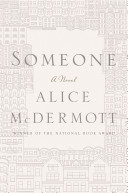
Me, personally, my reading mostly is a welter of older work that I never did get to and now very much wish to (Henry Williamson’s masterpiece Tarka the Otter, Charles Roberts’ masterpiece Red Fox, Joseph Conrad’s memoirs, Ulysses Grant’s memoirs, Annie Dillard’s Holy the Firm, Norman Lewis’ lean perfect haunting Naples ’44, about his service in the war), but the single best new book I have read in the last year is Alice McDermott’s Someone, which was pretty much as good as her novels After This, which was terrific, and Charming Billy, which was terrific and which won the National Book Award, not that national awards are any sure indication of sterling quality — Jerzy Kozinski won the National Book award, for heaven’s sake.
But I digress.
Let me count some of the ways McDermott is amazing.
One, she owns a place, a time, in the tradition of some of the best writers in American history — just as Faulkner owned a slice of Mississippi, and Flannery O’Connor a piece of Georgia, and Walker Percy some of Louisiana, and Edwin O’Connor some of Boston, and Joseph Mitchell some of New York, and William Kennedy some of upstate New York, and J.F. Powers some of Minnesota, and etc., McDermott owns Irish Catholic New York and Long Island in the 1950s and 1960s. No one ever wrote a better set of novels about that time and that place and those people, and here I can speak with rare authority, for I was one of those people and grew up among those people, and McDermott (who also grew up among those people) is their accurate amused brokenhearted celebratory gentle piercing bard, which thank God for that; every place and time ought to have a genius singer, seems to me — a Frank O’Connor in Ireland, a Helen Garner in Australia, a Robertson Davies in Canada.
Two, what a writer! Unlike yours truly she writes clean lean unadorned sentences that explore and plumb and open her stories without the slightest flash and burble, and yet they are sonorous, shimmering, sinuous. Lovely craft.
Three, by all accounts McDermott does not think she is cool or heroic or brilliant, which is a pleasant state of affairs in someone so in command of capacious artistic gifts.
Four, by her own account (see her superb essay in Boston College Magazine a while ago) she is a devout Catholic who is also blunt and honest about the way our beloved brave flawed church officially treats women dismissively, casually and foolishly tossing away the chance to mill the incredible energies and creativity of more than half its members. I find this refreshing.
Brian Doyle ’78 is the author most recently of a “sprawling sea novel” called The Plover.